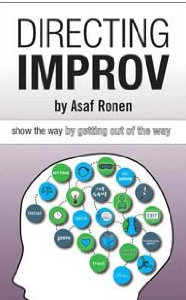I recently finished reading “Directing Improv: Show The Way By Getting Out Of The Way” by Asaf Ronen. Here’s the quotes I found interesting/useful.
 “Once you hit your goal, you’re going to want to go somewhere else.” –Bob Dassie (6)
“Once you hit your goal, you’re going to want to go somewhere else.” –Bob Dassie (6)
“It is harder to mark progress without a leader.” (6)
“In an improv scene, you can have the game of one-upsmanship between the two characters which employs the skill set of listening, character and environment.” (12)
“Look at what characters commit to most emotionally. That is where the drive is for the characters and thus is the drive for the scene.” (12)
“Just as players can sabotage themselves by going for the joke, directors can sabotage themselves by striving for the unique.” (13)
“When we forcefully strive to be unique, we are no longer fulfilling our purpose, which his to guide the group. Just as going for the joke at the expense of the scene is selfish, so is trying to make yourself look like a brilliant guru at the expense of real guidance. Your focus should always be on the group you are leading, rather than the specifics of what you are leading them through.” (13)
“Improvisation, for all its technique and complexities, can still be broken down into these two acts: making a choice and committing to that choice.” (16)
“Those who try to create their own definition of what the work truly is will find that they are still derivative of what came before, except now they have made it more complicated.” (17)
“Instead of spotlighting a player’s weakness, give them a challenge to focus on that will force them into other choices.” (22)
“Sometimes I will simply ask the troupe I am directing, “Which scene did you have the most fun doing? Which scene do you think I had the most fun watching?” (35)
“Allow yourself to be wrong and adapt every once in a while. It is a stronger place to build from than from a place of vagueness so as to appeal to everyone with whom you are working.” (42)
“All things, regardless of how subtle or bland, are choices, and that when we commit to them they become strong choices.” (63)
“What makes a choice strong and realistic is commitment.” (69)
“There is no killjoy as big as obligation when it comes to performing. (75)
“Keeping the concept to a single arc that can be defined in one sentence is a good way to guarantee simplicity and fun.” (85)
“You most definitely start your process by being selfish. In fact, you should embrace it. It is nice to say that the performance is for the audience, but it is not true, unless you are on a gig at a pediatric cancer ward or doing a show for the elderly or the homeless. You are first and foremost performing for yourself. It drives you. It speaks to you. It feeds you. Show appreciate for the audience at all times – they are paying you the honor of coming to see your show above everything else they could be doing – but do not create the show for them. Don’t blame them when the show doesn’t work and don’t create the show for them.” (86)
“Whatever the case may be, it will be easier to make a show more palatable to others once you have your own stakes in it figured out.” (86)
“There is a tendency to add new rules to safeguard against failure, but it is more effective to scale back the parameters that are already in place.” (88)
“While you do not have control over what the audience will like, you do have control over how strong your product is and that is a much more productive focus for you to have.” (89)
“If we focus too much on the other person’s actions, rather than developing our reactions, we stifle the flow.” (111)
“Sometimes people just need to be heard and know that they are heard so that they can feel valued.” (119)
“Not casting an extremely talented person because they are going to be high maintenance to deal with, is THE BEST reason to not cast someone.” –Joe Bill (120)
If you liked the quotes, buy and read the full book here.

